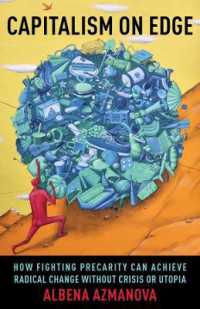- ホーム
- > 洋書
- > 英文書
- > Philosophy
基本説明
This study privileges politics, economics, technology, and geography as fundamental to generating discoveries in logic - grounding the discipline's abstract principles in a compelling material narrative.
Full Description
While logical principles seem timeless, placeless, and eternal, their discovery is a story of personal accidents, political tragedies, and broad social change. If A, Then B begins with logic's emergence twenty-three centuries ago and tracks its expansion as a discipline ever since. It explores where our sense of logic comes from and what it really is a sense of. It also explains what drove human beings to start studying logic in the first place. Logic is more than the work of logicians alone. Its discoveries have survived only because logicians have also been able to find a willing audience, and audiences are a consequence of social forces affecting large numbers of people, quite apart from individual will. This study therefore treats politics, economics, technology, and geography as fundamental factors in generating an audience for logic-grounding the discipline's abstract principles in a compelling material narrative.
The authors explain the turbulent times of the enigmatic Aristotle, the ancient Stoic Chrysippus, the medieval theologian Peter Abelard, and the modern thinkers Rene Descartes, David Hume, Jeremy Bentham, George Boole, Augustus De Morgan, John Stuart Mill, Gottlob Frege, Bertrand Russell, and Alan Turing. Examining a variety of mysteries, such as why so many branches of logic (syllogistic, Stoic, inductive, and symbolic) have arisen only in particular places and periods, If A, Then B is the first book to situate the history of logic within the movements of a larger social world. If A, Then B is the 2013 Gold Medal winner of Foreword Reviews' IndieFab Book of the Year Award for Philosophy.
Contents
Preface Introduction: What Is Logic? 1. The Dawn of Logic 2. Aristotle: Greatest of the Greek Logicians 3. Aristotle's System: The Logic of Classification 4. Chrysippus and the Stoics: A World of Interlocking Structures 5. Logic Versus Antilogic: The Laws of Contradiction and Excluded Middle 6. Logical Fanatics 7. Will the Future Resemble the Past? Inductive Logic and Scientific Method 8. Rhetorical Frauds and Sophistical Ploys: Ten Classic Tricks 9. Symbolic Logic and the Digital Future 10. Faith and the Limits of Logic: The Last Unanswered Question Appendix: Further Fallacies Notes Bibliography Index








